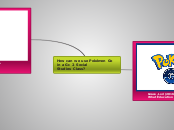av Amelia Chang för 9 årar sedan
1360
Pokemon Go in the Gr. 2 Social Studies Class
Ceci est un échantillon de carte mentale.

av Amelia Chang för 9 årar sedan
1360

Mer av detta
Teachers should just provide students with the inquiry question and let students critically think of their own response to the question.
Positive and negative effects have just been brainstormed for the teacher's benefit when planning or thinking about their problem conceptually.
Interpersonal: Take Selfies with other trainers that you meet at Pokestops and talk about tips and tricks.
21st century skills: Collaboration made possible through gathering at Pokestops and setting a Lure.
Animals by region: What comparisons can be made with the types of Pokémon found by region?